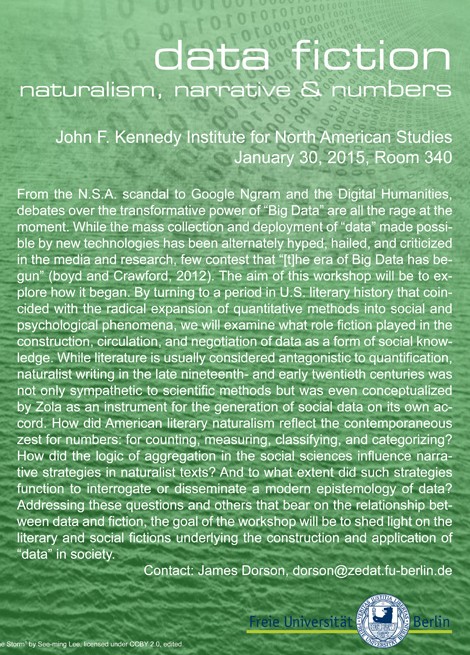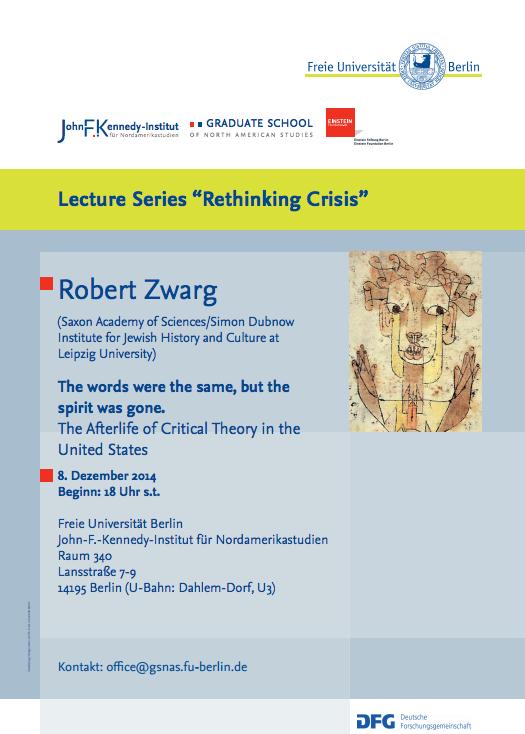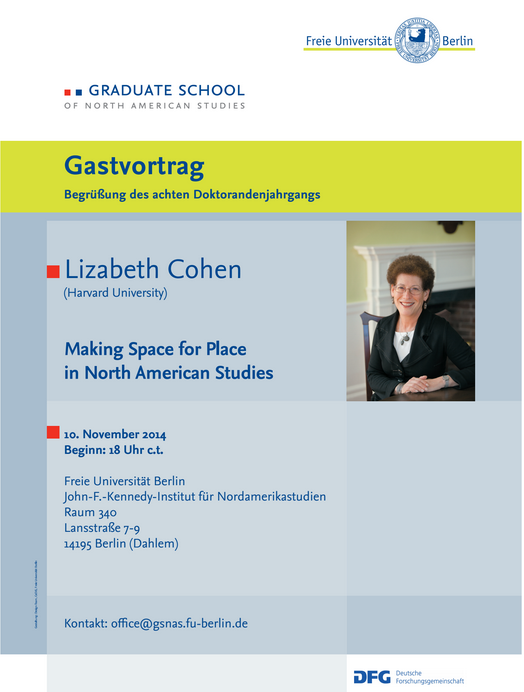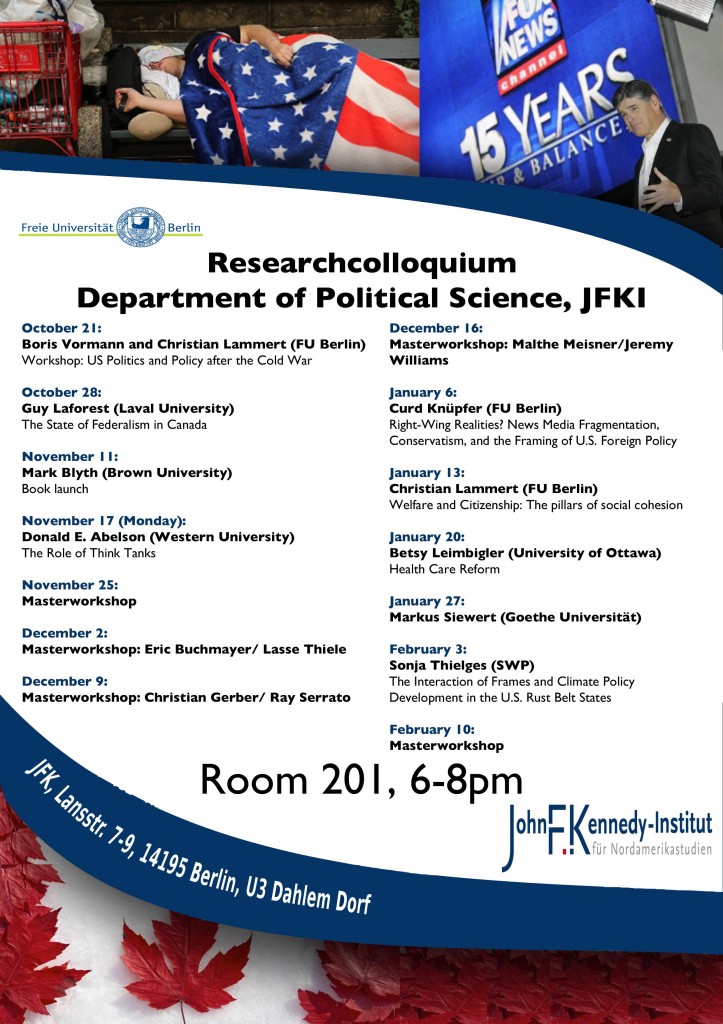17. Februar 2015 von Curd Knüpfer
What’s up, America?
Perspectives on the United States and Transatlantic Relations
Auftaktveranstaltung der neuen USA-Reihe der Bundeszentrale für politische Bildung,
12. März 2015, 19 – 21 Uhr, Auditorium Friedrichstraße
Einst waren die Vereinigten Staaten von Amerika Vorbild des Westens, wie es schien der ganzen Welt. Heute jedoch häufen sich die kritischen Stimmen, auch im eigenenLand. Die neue Veranstaltungsreihe der Bundeszentrale für politische Bildung/bpb wird beide Seiten des Amerikabildes beleuchten und dabei einen Blick auf die fortwährende Faszination werfen, die das Land immer noch ausübt, sowie aktuelle Problemstellungen und Außenperspektiven analysieren. Denn es sind die vielen Gegensätze, welche die USA prägen und einzigartig machen, die aber auch viele Europäer immer wieder irritieren. Ein Land, welches sich Vielfältigkeit bereits im Gründungsmotto („E Pluribus Unum – Aus Vielen Eines“) auf die Fahne schreibt, kann nur durch einen interdisziplinären Ansatz verstanden werden. Aus diesem Grund wird sich die neue USA-Reihe der bpb mit Aspekten der Kultur, Gesellschaft, Wirtschaft und Politik befassen, um diese einzelnen Bereiche nach und nach zu einem vielfältigen Gesamtbild zusammenzusetzen und dessen Wahrnehmung in Europa kritisch zu reflektieren. Um diesem Anspruch gerecht zu werden, wird die Veranstaltungsreihe verschiedene Themenabende zu bestimmten Schwerpunkten anbieten. Die Auftaktveranstaltung am 12. März 2015 im Berliner Auditorium Friedrichstraße wird eine Einführung in den Mythos Amerika anbieten. Im Fokus der Diskussion werden dabei Fragen stehen wie: „Wo steht Amerika?“, „Wohin geht Amerika?“ und „Wie ist es derzeit um die transatlantischen Beziehungen bestellt?“
Durch den Abend führen werden die deutsch-amerikanischen Journalisten Dr. Melinda Crane und Dr. Christoph von Marschall. Melinda Crane lebt bereits seit langer Zeit in Deutschland und kommentiert für verschiedenste Medien das politische Geschehen in ihrem Heimatland. Christoph von Marschall war langjähriger USAKorrespondent des Berliner Tagesspiegels und verfasste zahlreiche Bücher zum Thema USA. Als Moderationsteam werden sie den Dialog gestalten: zwischen den Vereinigten Staaten und Europa, zwischen konservativ und liberal, zwischen urbanem Aufschwung und der Agrarnation USA, zwischen amerikanischen Interessen und den anderen Akteuren auf der weltpolitischen Bühne. Die Veranstaltung wird vom John-F.-Kennedy-Institut für Nordamerikastudien unterstützt.
Termin: 12. März 2015, 19 – 21 Uhr
Ort: Auditorium Friedrichstraße, Im Quartier 110, Friedrichstraße 180, 10117 Berlin
Veranstalter: Bundeszentrale für politische Bildung/ bpb
Teilnahmegebühr: keine
Anmeldung: https://lcem.lab-concepts.de/registration/whats-up-america
Die Veranstaltungsreihe ist online unter: www.bpb.de/veranstaltungen/format/198685/what-s-up-america zu erreichen.
Kategorie Events, Veranstaltungen | Kommentare deaktiviert für Veranstaltungsreihe der Bundeszentrale für politische Bildung „What’s up, America? Perspectives on the United States and Transatlantic Relations“
15. Januar 2015 von Curd Knüpfer
On Wednesday, January 21, 2015, Mathias Großklaus will present his project
„Targeted Killing and the Assassination Taboo between States: A Historical Perspective on Norm Dynamics in International Relations“.
The workshop takes place from 14:15 to 15:45 in the seminar room of the Graduate School.
Kategorie Department of Political Science, GSNAS | Kommentare deaktiviert für Interdisciplinary Forum at the Graduate School of North American Studies: Mathias Großklaus
14. Januar 2015 von Curd Knüpfer
Kategorie Department of Culture, Department of Literature, Events, Veranstaltungen | Kommentare deaktiviert für Upcoming Conference on „Data Fiction“ — January 30, 2015
5. Januar 2015 von Curd Knüpfer
On Wednesday, January 7, 2015, Birte Wege will present her project
„Drawing on the Past: Graphic Narrative Documentary„.
The workshop takes place from 14:15 to 15:45 in the seminar room of the Graduate School.
Kategorie Department of Literature, GSNAS | Kommentare deaktiviert für Interdisciplinary Forum at the GSNAS on January 7, 2015 (Birte Wege)
15. Dezember 2014 von Curd Knüpfer
Alliances
Un/Common Causes and the Politics of Participation
May 7–9, John F. Kennedy Institute, Freie Universität Berlin
Seventy years after the United States aligned themselves with the Soviet Union to move together against Nazi Germany, unusual alliances continue to shift power relations and fundamentally transform our societies. Born out of crises, such upheavals often extend beyond economics and national politics into the allocation of rights and issues of legitimacy, justice, and everyday livelihood. Recently, global events have prompted popular mobilization and participation across various cultural, socioeconomic, and political boundaries. Ferguson (Missouri), Tahrir Square (Egypt), Zucotti Park (New York), and Ayotzinapa (Mexico) have transcended different materialities, on- and offline, and turned into tropes for larger transformative demands, forging real and imagined communities in the process. On a different scale, global economic, environmental, and geopolitical challenges are fostering unusual bonds between unlikely allies. Evolving modes of collaborative production, such as crowdfunding, are changing the way we relate, create, and consume. Volatile web crowds and conflicting coalitions are contesting traditional notions of allegiance and loyalty while allowing for an astute discerning of historical patterns. All these developments call for an updated understanding of alliances in the field of North American Studies.
How can we situate, frame, and conceptualize alliances today? Are there plausible rhetorical links to be drawn between, for instance, protesters in Hong Kong and the inhabitants of Ferguson? What would they tell us about a sense of shared experience and the politics of empathy? Is there a way—or a need at all—to describe the formation of these kinds of transversal linkages with a vocabulary outside the liberal humanist tradition of solidarity? And how have cultural producers who align themselves with social and political causes facilitated the emergence and evolution of aesthetic forms, e.g. in documentary fiction in literature and film?
This conference explores the histories, presences, and futures of alliance making. Transdisciplinary and transnational in scope, it foregrounds the complex interplay between the imaginary and the material. We invite speakers to think with, through, and beyond the following issues:
- hegemonic alliances vs. grassroots organizing
- mobs, crowds, and gatherings: performativity and agency in numbers
- fragmented, operation-based initiatives and intersectional justice movements
- cultural resonances and literary representations of alliances
- the aesthetics of co-option and cooperation
- delinking strategies and dissolving coalitions
- peer-to-peer finance (e.g. crowdfunding) and other collaborative investments
- networked materialities, virtual and posthuman alliances
- alliances and social participation in historical perspective
Please submit an abstract of no more than 250 words and a short CV to alliances@gsnas.fu- berlin.de. The proposal deadline is February 16, 2015.
Selected presenters will be notified by March 17, 2015.
Kategorie Announcements, Events, GSNAS | Kommentare deaktiviert für Call for Papers: GSNAS International Conference 2015
10. Dezember 2014 von Curd Knüpfer
On Wednesday, December 17, 2014, Katharina Metz will present her project „Reading for Altruism. Doing Good in the Late Nineteenth Century“.
The workshop takes place from 14:15 to 15:45 in the seminar room of the Graduate School.
Kategorie Events, GSNAS | Kommentare deaktiviert für Interdisciplinary Forum at the Graduate School of North American Studies
30. November 2014 von Irwin Collier
Kategorie General Information | Kommentare deaktiviert für Veritas, Iustitia, Libertas
25. November 2014 von Curd Knüpfer
Kategorie Events, GSNAS | Kommentare deaktiviert für Lecture, Monday Dec. 8: The Afterlife of Critical Theory in the United States
23. November 2014 von Christian Lammert
Die ARD Tagesschau sprach zu diesem Thema mit Christian Lammert vom John-F-Kennedy Institut. Unter folgenden Link kann das Video angeschaut und heruntergeladen werden: https://www.tagesschau.de/multimedia/video/video-42015.html
Kategorie General Information | Kommentare deaktiviert für Obama kündigt Reformschritte in der Einwanderungspolitik an
29. Oktober 2014 von Curd Knüpfer
Kategorie Events, GSNAS | Kommentare deaktiviert für Lizabeth Cohen: Guest Lecture and Welcoming of 2014 GSNAS Cohort
28. Oktober 2014 von Curd Knüpfer
Kategorie Department of Political Science, Veranstaltungen | Kommentare deaktiviert für Department of Political Science Researchcolloquium Winter Term 2014/15
24. Oktober 2014 von Christian Lammert
Christian Lammert im Interview auf DeutschlandradioKultur:
Kategorie General Information | Kommentare deaktiviert für Terroranschläge auf das kanadische Parlament in Ottawa – Christian Lammert im Interview auf DeutschlandradioKultur






 Die
Die